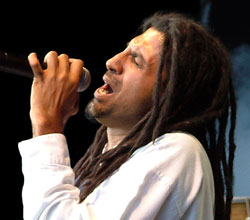Apache Indian

Real Name: Steve Kapur
Born: May 11th, 1967
Place of Birth: Birmingham, UK
Official website: www.karmasound.com
The "Don Raja" of UK Asian raggamuffin, Apache Indian came to represent a cross-cultural fusion of musics that both baffled and excited pundits and punters alike in the mid-90s.
Apache Indian grew up in Handsworth, Birmingham, in the 70s - an era when the city was being celebrated as a kind of UK reggae melting pot through the efforts of Steel Pulse, and others, whose Handsworth Revolution album first put it on the musical map. Although he was of Indian parentage, Apache associated with reggae sound systems in the early 80s, sporting dreadlocks and an abiding love of Bob Marley. By the mid-80s, locks trimmed to a sharp fade, he was known locally on the mic as a dancehall rapper, and in 1990 he cut his first single, "Movie Over India", as a white label, later picked up by UK reggae distributors Jet Star. A compelling, catchy ragga tune, with a few elements of bhangra, the preferred music of many UK Asians, the record was a huge hit in both the reggae and bhangra markets. Two more cult hits followed, "Chok There" and "Don Raja', before the majors became interested in him.
Island Records finally lured him into a contract, and 1993"s No Reservations was cut in Jamaica and included Sly Dunbar, Bobby Digital and Robert Livingstone producing. Critically acclaimed, it saw Apache move away from the frothier elements of his distinctive ragga-reggae and towards a role as social commentator and Anglo-Asian representative. This approach was exemplified in the three crossover hits, "Arranged Marriage", "Boom Shack-A-Lak' (from 1993"s Nuff Vibes EP) and "Movin' On", the latter a cry of resistance against the election of a BNP member to a council seat in Tower Hamlets, London.
Apache Indian's assimilation into the mainstream music business continued apace, although he drew some flak from the more traditional elements in the reggae business, who may have been displeased at the apparent ease with which he conquered the pop charts, and he subsequently began to lose his ragga audience. His propensity for winning awards (Best Newcomer in the UK Reggae Industry Awards 1990, a short list entry for the Mercury Prize in 1993 and a nomination for four BRIT Awards in 1994) and his open, friendly personality made him a media favourite throughout 1993. Subsequent albums were artistically disappointing, and, crucially, commercial success also began to elude Apache Indian.
By 1997's Real People his association with Island had come to an end.
Encyclopedia of Popular Music
Copyright Muze UK Ltd. 1989 - 2005
Source - BBC Music Profiles
